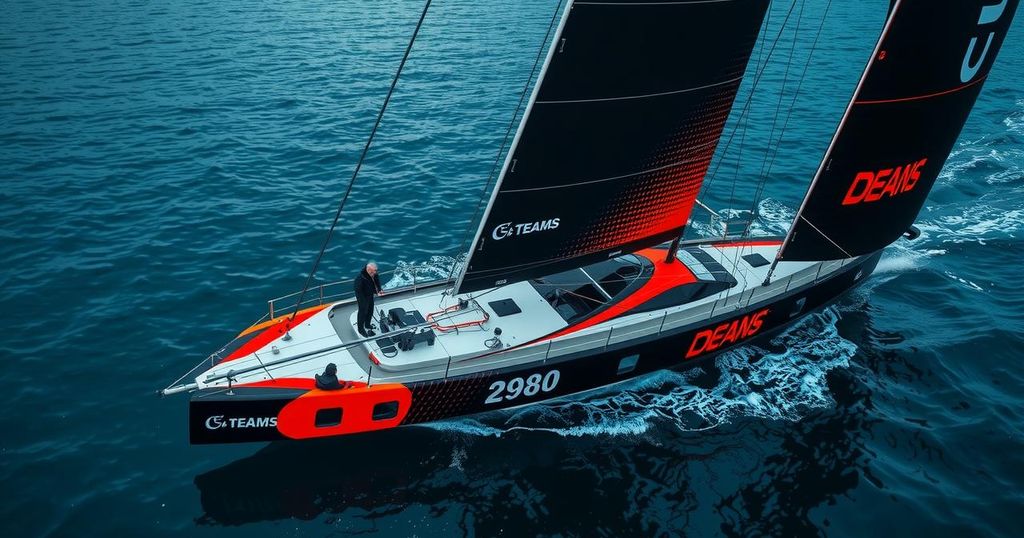The Ocean Race Europe is set to begin on August 10, 2025, from Kiel, Germany, as a significant sporting and ecological event focused on raising awareness regarding oceanic issues. With four teams confirmed and an expected participation of up to ten teams, the race will include legs through the East and North Seas, culminating in Cartagena, Spain, and returning to Genoa, Italy. The event not only offers competitive opportunities but aims to foster awareness and action toward marine conservation.
The Ocean Race Europe is taking shape with about eleven months remaining until its commencement in Kiel. The event seeks to raise awareness regarding oceanic issues and has positioned itself as a significant sporting, media, and educational venture. Following a media kickoff on September 17 in Kiel, where the only confirmed participants were Team Malizia led by Boris Herrmann and Holcim PRB helmed by Rosalin Kuiper, interest has surged with four teams now confirmed to participate and more showing readiness to join. The route also has a fixed destination: the Boka Bay in Montenegro is set to welcome the Imoca yachts. During the media kickoff, Race Chairman Richard Brisius presented the foundational elements of the European race, set to commence on August 10, 2025, from Kiel and progress into the Mediterranean. Kiel was previously named as the starting point for The Ocean Race Europe earlier this year, and now additional host ports are being finalized. The first leg will take competitors from the East and North Seas to Portsmouth, a city of historical importance to the race, where the concept of the inaugural Whitbread Round the World Race was conceived over fifty years ago. From Portsmouth, teams will traverse through the Bay of Biscay, the Atlantic, and ultimately reach the Mediterranean, concluding the second leg in Cartagena, Spain. Following this, the race will make its way back to Genoa, Italy—a city where both the 2021 Europe Race and the 2023 World Race concluded, although this time it will not serve as the race’s endpoint. The number of registered teams has grown, with Team Paprec Arkéa now also entering the race. Skipper Yoann Richomme has garnered attention as a significant figure in the Imoca scene, having achieved second place in the recent Transat Jacques Vabres and earlier victories in various competitions. Additionally, a new Swiss team, spearheaded by Elodie Mettraux along with Simon Koster and Alan Roura, is in formation, officially launching in 2025. The Swiss Offshore Team aims to utilize Alan Roura’s current boat, Hublot, for their debut at The Ocean Race Europe, with further participation planned for the Ocean Race Atlantic and the World Race in subsequent years. Race organizers predict a minimum of six, possibly up to ten Imoca teams at the starting line. Notably, the DMG Mori team, led by Japanese skipper Kojiro Shiraishi, has expressed intentions to construct a new yacht for the World Race by designer Guillaume Verdier, aimed at his crew’s mixed-gender participation. Holcim’s skipper, Rosalin Kuiper, expressed her enthusiasm regarding the planning, stating, “I am looking forward to the start in Kiel. Last year, I witnessed the excitement for this race in Germany.” She emphasized the unique strategic requirements of the race, contrasting it with the global competition, and underscored its value for emerging professionals in the sailing industry. Kiel’s Mayor, Ulf Kämpfer, shared in this excitement, highlighting the city’s passionate engagement with water sports and a commitment to marine protection and sustainability goals. He mentioned, “We are so proud to have this race here… it speaks volumes about the enthusiasm in this city for water sports.” This collaboration aligns with Kiel’s aspiration to become a model of marine preservation and climate neutrality, as they aim for 2035. Race Chairman Brisius acknowledged the synergy, stating, “We will gladly come to Kiel for the race. We share common thoughts.” He reiterated the importance of raising awareness regarding the oceans, emphasizing the need for public recognition of their value. The scientific partnership initiated between Geomar and The Ocean Race in 2017 has already resulted in the collection of four million data points on ocean health, aiding scientific research. Overall, as The Ocean Race shifts from merely a sailing event to a platform for ocean health advocacy, the organizers hope to not only provide thrilling competition but also foster awareness and encourage conservation efforts across the globe.
The Ocean Race Europe is an upcoming sailing competition designed to highlight ecological issues facing the oceans while providing a competitive platform for sailing teams. Set to begin in August 2025, this event follows the legacy of previous races and aims to unite teams from various backgrounds to amplify their message about ocean health and sustainable practices. The race is particularly significant for its focus on professional development for sailors and fostering international collaboration in marine science and conservation efforts. The historical context, with roots dating back to the Whitbread Round the World Race, also enriches its current initiatives.
The Ocean Race Europe is more than just a competitive sailing event; it serves as a pivotal platform for raising awareness about ocean conservation and sustainability. With a growing number of participant teams and a well-defined race route culminating in the Mediterranean, the event promises to be both exciting and purposeful. The collaboration between race organizers, participating teams, and local authorities emphasizes a collective commitment to marine protection as the sailing community gears up for this significant endeavor. Through scientific partnerships and community engagement, The Ocean Race Europe aims to inspire change and provoke deeper public interest in preserving the health of our oceans.
Original Source: floatmagazin.de

Leave a Reply